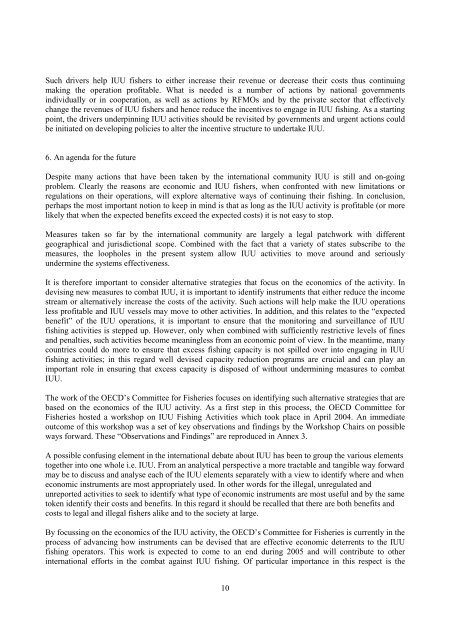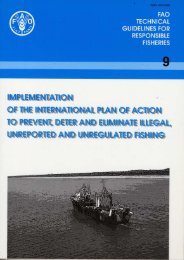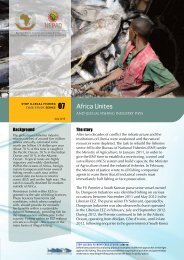1 Addressing Illegal, Unreported and Unregulated (IUU ... - OECD
1 Addressing Illegal, Unreported and Unregulated (IUU ... - OECD
1 Addressing Illegal, Unreported and Unregulated (IUU ... - OECD
You also want an ePaper? Increase the reach of your titles
YUMPU automatically turns print PDFs into web optimized ePapers that Google loves.
Such drivers help <strong>IUU</strong> fishers to either increase their revenue or decrease their costs thus continuingmaking the operation profitable. What is needed is a number of actions by national governmentsindividually or in cooperation, as well as actions by RFMOs <strong>and</strong> by the private sector that effectivelychange the revenues of <strong>IUU</strong> fishers <strong>and</strong> hence reduce the incentives to engage in <strong>IUU</strong> fishing. As a startingpoint, the drivers underpinning <strong>IUU</strong> activities should be revisited by governments <strong>and</strong> urgent actions couldbe initiated on developing policies to alter the incentive structure to undertake <strong>IUU</strong>.6. An agenda for the futureDespite many actions that have been taken by the international community <strong>IUU</strong> is still <strong>and</strong> on-goingproblem. Clearly the reasons are economic <strong>and</strong> <strong>IUU</strong> fishers, when confronted with new limitations orregulations on their operations, will explore alternative ways of continuing their fishing. In conclusion,perhaps the most important notion to keep in mind is that as long as the <strong>IUU</strong> activity is profitable (or morelikely that when the expected benefits exceed the expected costs) it is not easy to stop.Measures taken so far by the international community are largely a legal patchwork with differentgeographical <strong>and</strong> jurisdictional scope. Combined with the fact that a variety of states subscribe to themeasures, the loopholes in the present system allow <strong>IUU</strong> activities to move around <strong>and</strong> seriouslyundermine the systems effectiveness.It is therefore important to consider alternative strategies that focus on the economics of the activity. Indevising new measures to combat <strong>IUU</strong>, it is important to identify instruments that either reduce the incomestream or alternatively increase the costs of the activity. Such actions will help make the <strong>IUU</strong> operationsless profitable <strong>and</strong> <strong>IUU</strong> vessels may move to other activities. In addition, <strong>and</strong> this relates to the “expectedbenefit” of the <strong>IUU</strong> operations, it is important to ensure that the monitoring <strong>and</strong> surveillance of <strong>IUU</strong>fishing activities is stepped up. However, only when combined with sufficiently restrictive levels of fines<strong>and</strong> penalties, such activities become meaningless from an economic point of view. In the meantime, manycountries could do more to ensure that excess fishing capacity is not spilled over into engaging in <strong>IUU</strong>fishing activities; in this regard well devised capacity reduction programs are crucial <strong>and</strong> can play animportant role in ensuring that excess capacity is disposed of without undermining measures to combat<strong>IUU</strong>.The work of the <strong>OECD</strong>’s Committee for Fisheries focuses on identifying such alternative strategies that arebased on the economics of the <strong>IUU</strong> activity. As a first step in this process, the <strong>OECD</strong> Committee forFisheries hosted a workshop on <strong>IUU</strong> Fishing Activities which took place in April 2004. An immediateoutcome of this workshop was a set of key observations <strong>and</strong> findings by the Workshop Chairs on possibleways forward. These “Observations <strong>and</strong> Findings” are reproduced in Annex 3.A possible confusing element in the international debate about <strong>IUU</strong> has been to group the various elementstogether into one whole i.e. <strong>IUU</strong>. From an analytical perspective a more tractable <strong>and</strong> tangible way forwardmay be to discuss <strong>and</strong> analyse each of the <strong>IUU</strong> elements separately with a view to identify where <strong>and</strong> wheneconomic instruments are most appropriately used. In other words for the illegal, unregulated <strong>and</strong>unreported activities to seek to identify what type of economic instruments are most useful <strong>and</strong> by the sametoken identify their costs <strong>and</strong> benefits. In this regard it should be recalled that there are both benefits <strong>and</strong>costs to legal <strong>and</strong> illegal fishers alike <strong>and</strong> to the society at large.By focussing on the economics of the <strong>IUU</strong> activity, the <strong>OECD</strong>’s Committee for Fisheries is currently in theprocess of advancing how instruments can be devised that are effective economic deterrents to the <strong>IUU</strong>fishing operators. This work is expected to come to an end during 2005 <strong>and</strong> will contribute to otherinternational efforts in the combat against <strong>IUU</strong> fishing. Of particular importance in this respect is the10
















